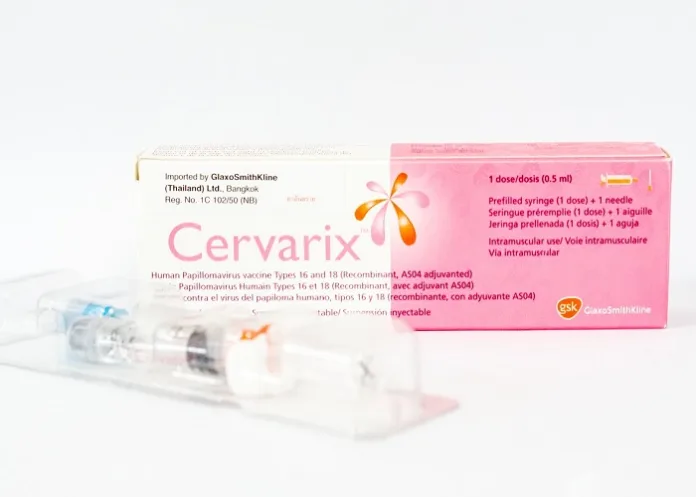The bivalent human papillomavirus vaccine (HPV) Cervarix was highly effective in protecting women from cervical cancer when given between the ages of 12 and 13, said researchers, after reviewing data from nearly half a million women who had received the jab when it was first introduced.
The team had collected data in 2020 from 447 845 women born between 1988 and 1996 from the Scottish cervical cancer screening system to assess the efficacy of Cervarix in lowering rates of cervical cancer, reports Medscape.
Cervical cancer is the fourth most common cancer among women worldwide, and programmes to provide Cervarix began in the UK in 2007.
Thereafter, administering the vaccine became part of routine care for girls starting at the age of 12.
The researchers said they correlated the rate of cervical cancer per 100 000 person-years with data on women regarding vaccination status, age when vaccinated, and deprivation in areas like income, housing, and health.
No cases of cervical cancer were found among those immunised at 12 or 13, no matter how many doses they received.
Women who were immunised between 14 and 18 and received three doses had fewer instances of cervical cancer compared with unvaccinated women, regardless of deprivation status (3.2 cases per 100 00 women vs 8.4 cases per 100 000).
A limitation of the study was that only 14 645 women had received just one or two doses, which may have affected the statistical analysis.
The authors suggested that continued participation in screening and monitoring of outcomes was required “to assess the effects of changes in vaccines used and dosage schedules since the start of vaccination in Scotland in 2008 and the longevity of protection the vaccines offer”.
The study, published in Journal of the National Cancer Institute, was led by Timothy Palmer, PhD, Scottish Clinical Lead for Cervical Screening at Public Health Scotland.
Study details
Invasive cervical cancer incidence following bivalent human papillomavirus vaccination: a population-based observational study of age at immunisation, dose, and deprivation
Tim Palmer, Kimberley Kavanagh, Kirsty Roy, et al.
Published in Journal of National Cancer Institute on 22 January 2024
Abstract
Background
High-risk human papillomavirus causes cervical cancer. Vaccines have been developed that significantly reduce the incidence of preinvasive and invasive disease. This population-based observational study used linked screening, immunisation, and cancer registry data from Scotland to assess the influence of age, number of doses, and deprivation on the incidence of invasive disease following administration of the bivalent vaccine.
Methods
Data for women born between 1 January 1988, and 5 June 1996, were extracted from the Scottish cervical cancer screening system in July 2020 and linked to cancer registry, immunisation, and deprivation data. Incidence of invasive cervical cancer per 100 000 person-years and vaccine effectiveness were correlated with vaccination status, age at vaccination, and deprivation; Kaplan Meier curves were calculated.
Results
No cases of invasive cancer were recorded in women immunized at 12 or 13 years of age irrespective of the number of doses. Women vaccinated at 14 to 22 years of age and given three doses of the bivalent vaccine showed a significant reduction in incidence compared with all unvaccinated women (3.2/100 000 [95% confidence interval (CI) = 2.1 to 4.6] vs 8.4 [95% CI = 7.2 to 9.6]). Unadjusted incidence was significantly higher in women from most deprived (Scottish Index of Multiple Deprivation 1) than least deprived (Scottish Index of Multiple Deprivation 5) areas (10.1/100 000 [95% CI = 7.8 to 12.8] vs 3.9 [95% CI = 2.6 to 5.7]). Women from the most deprived areas showed a significant reduction in incidence following three doses of vaccine (13.1/100 000 [95% CI = 9.95 to 16.9] vs 2.29 [95% CI = 0.62 to 5.86]).
Conclusion
Our findings confirm that the bivalent vaccine prevents the development of invasive cervical cancer and that even one or two doses oone month apart confer benefit if given at 12-13 years of age. At older ages, three doses are required for statistically significant vaccine effectiveness. Women from more deprived areas benefit more from vaccination than those from less deprived areas.
Medscape article – HPV Vaccine Shown to Be Highly Effective in Girls Years Later (Open access)
See more from MedicalBrief archives:
HPV vaccine cuts cervical cancer by nearly 90% — UK population registry study
HPV vaccine significantly lowers infection rates in teen girls — CDC study
Single HPV vaccine dose may be effective against cervical cancer
1

